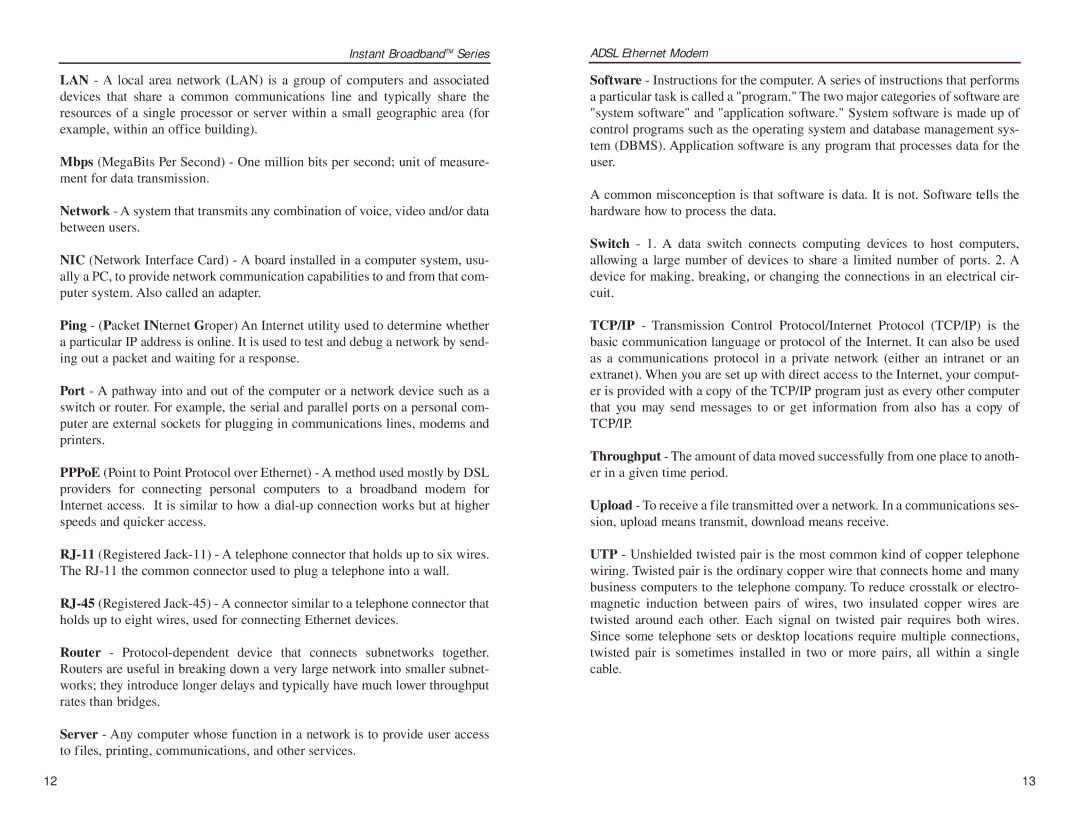Instant BroadbandTM Series
LAN - A local area network (LAN) is a group of computers and associated devices that share a common communications line and typically share the resources of a single processor or server within a small geographic area (for example, within an office building).
Mbps (MegaBits Per Second) - One million bits per second; unit of measure- ment for data transmission.
Network - A system that transmits any combination of voice, video and/or data between users.
NIC (Network Interface Card) - A board installed in a computer system, usu- ally a PC, to provide network communication capabilities to and from that com- puter system. Also called an adapter.
Ping - (Packet INternet Groper) An Internet utility used to determine whether a particular IP address is online. It is used to test and debug a network by send- ing out a packet and waiting for a response.
Port - A pathway into and out of the computer or a network device such as a switch or router. For example, the serial and parallel ports on a personal com- puter are external sockets for plugging in communications lines, modems and printers.
PPPoE (Point to Point Protocol over Ethernet) - A method used mostly by DSL providers for connecting personal computers to a broadband modem for Internet access. It is similar to how a
Router -
Server - Any computer whose function in a network is to provide user access to files, printing, communications, and other services.
ADSL Ethernet Modem
Software - Instructions for the computer. A series of instructions that performs a particular task is called a "program." The two major categories of software are "system software" and "application software." System software is made up of control programs such as the operating system and database management sys- tem (DBMS). Application software is any program that processes data for the user.
A common misconception is that software is data. It is not. Software tells the hardware how to process the data.
Switch - 1. A data switch connects computing devices to host computers, allowing a large number of devices to share a limited number of ports. 2. A device for making, breaking, or changing the connections in an electrical cir- cuit.
TCP/IP - Transmission Control Protocol/Internet Protocol (TCP/IP) is the basic communication language or protocol of the Internet. It can also be used as a communications protocol in a private network (either an intranet or an extranet). When you are set up with direct access to the Internet, your comput- er is provided with a copy of the TCP/IP program just as every other computer that you may send messages to or get information from also has a copy of TCP/IP.
Throughput - The amount of data moved successfully from one place to anoth- er in a given time period.
Upload - To receive a file transmitted over a network. In a communications ses- sion, upload means transmit, download means receive.
UTP - Unshielded twisted pair is the most common kind of copper telephone wiring. Twisted pair is the ordinary copper wire that connects home and many business computers to the telephone company. To reduce crosstalk or electro- magnetic induction between pairs of wires, two insulated copper wires are twisted around each other. Each signal on twisted pair requires both wires. Since some telephone sets or desktop locations require multiple connections, twisted pair is sometimes installed in two or more pairs, all within a single cable.
12 | 13 |
